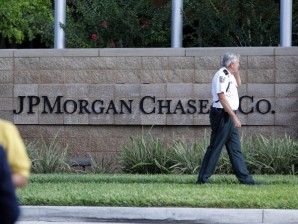WASHINGTON — Under fire JPMorgan chief executive Jamie Dimon narrowly defeated a shareholder move to curb his power Tuesday, as he battled to save the bank’s reputation after a shock $2 billion loss.

Morgan Chase annual stockholders meeting held Tuesday, May 15, 2012, in Tampa, Fla. JPMorgan Chase CEO Jamie Dimon will speak to shareholders five days after disclosing a $2 billion trading loss. AP/SCOTT ISKOWITZ
Dimon avoided a humiliating dissolution of his power as just four in ten JPMorgan shareholders voted to separate his dual positions as chairman and CEO at an annual meeting in Tampa.
On Thursday the bank revealed that a trading scheme, originally aimed to hedge risks, appeared to have evolved into an aggressive and complex bet on the direction of the economy that went spectacularly wrong.
The full extent of the losses is not yet known; nor is the damage to JPMorgan and Dimon’s reputation, and the bank’s share price.
After having outperformed most competitors in the last year JPMorgan’s shares have tumbled almost 10 percent since the losses were revealed.
Dimon reiterated his view that the losses, taken over just six weeks thanks to bets on complex derivatives trades using the bank’s own assets, were the result of mistakes rather than a misguided strategy.
“It should never have happened. I can’t justify it, unfortunately these mistakes were self-inflicted,” Dimon told shareholders. “No clients were affected, no customers suffered as a result of our mistakes.”
He added that changes were already being made.
“There are many lessons here and many changes in policy and procedures that are already being implemented.”
On Monday Ina Drew, who headed the JPMorgan’s chief investment office (CIO) that was in charge of the trading scheme, stepped down as the bank announced her “retirement” after 30 years at the bank.
Drew was a key Dimon lieutenant and one of Wall Street’s most visible women.
She was immediately replaced by another top JPMorgan official who moved to take the reins of the London office where the errant trading scheme apparently took place.
Dimon also rejected complaints that he has actively lobbied against the type of regulation that could have avoided the debacle.
“We are not against new regulation, we supported 70-80 percent of Dodd Frank regulations.”
“We all want better, smarter and strong regulation that is based on facts and analysis.”
The White House and members of Congress have stepped up pressure for tighter bank regulation of the banks, including a broad ban on the speculative proprietary trade that has hurt many of them in the derivatives markets.
Dimon has been a vocal opponent of proposed controls on proprietary trading.
In an interview on ABC television’s “The View,” broadcast on Tuesday, Obama described JPMorgan chief Jamie Dimon as “one of the smartest bankers we got” but adding, “they still lost money.”
“They still lost $2 billion and counting precisely because they were making bets in these derivative markets. This is why we passed Wall Street reform.”